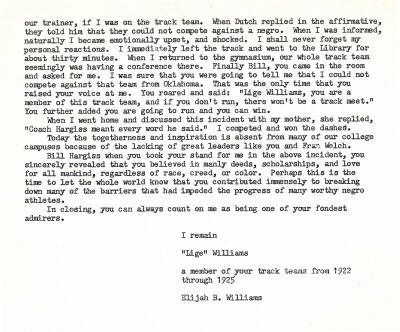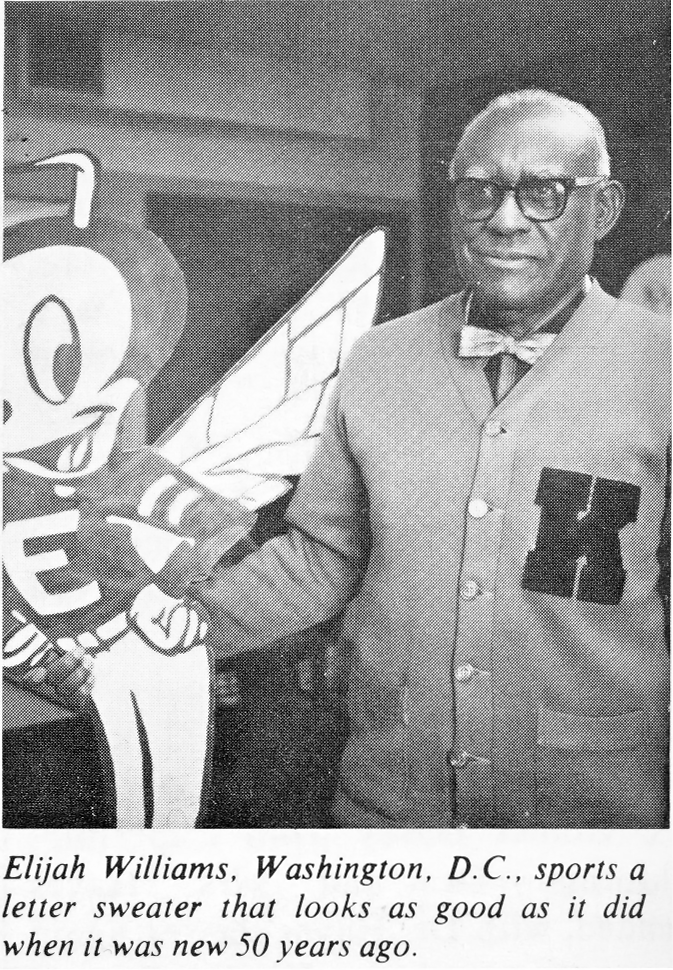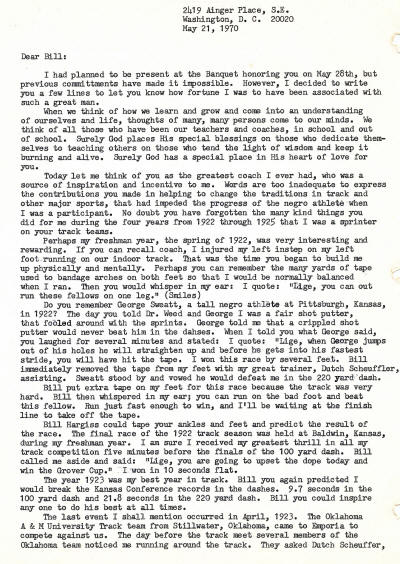|
|
2419 Ainger Place, S.E.
Washington, D. C. 20020
May 21, 1970
Dear Bill:
I had planned to be present at the Banquet honoring you on May 28th, but previous commitments have made it impossible. However, I decided to write you a few lines to let you know how fortune I was to have been associated with such a great man.
When we think of how we learn and grow and come into an understanding of ourselves and life, thoughts of many, many persons come to our minds. We think of all those who have been our teachers and coaches, in school and out of school. Surely God places His special blessings on those who dedicate themselves to teaching others on those who tend the light of wisdom and keep it burning and alive. Surely God has a special place in His heart of love for you.
Today let me think of you as the greatest coach I ever had, who was a source of inspiration and incentive to me. Words are too inadequate to express the contributions you made in helping to change the traditions in track and other major sports, that had impeded the progress of the negro athlete when I was a participant. No doubt you have forgotten the many kind things you did for me during the four years from 1922 through 1925 that I was a sprinter on your track teams.
Perhaps my freshman year, the spring of 1922, was very interesting and rewarding. If you can recall coach, I injured my left instep on my left foot running on our indoor track. That was the time you began to build me up physically and mentally. Perhaps you can remember the many yards of tape used to bandage arches on both feet so that I would be normally balanced when I ran. Then you would whisper in my ear: I quote: "Lige, you can out run these fellows on one leg." (Smiles)
Do you remember George
Sweatt, a tall negro athlete at Pittsburgh, Kansas, in 1922? The day you told Dr.
Weed and George I was a fair shot putter, that fooled around with the sprints. George
told me that a crippled shot putter would never beat him in the dashes. When I told
you what George said, you laughed for several minutes and st ated: I quote: "Lige,
when George jumps out of his holes he will straighten up and before he gets into
his fastest stride, you will have hit the tape. I won this race by several feet. Bill immediately removed the tape from my feet with
my
great trainer, Dutch Scheuffer, assisting. Sweatt stood by
and vowed he would defeat me in the 220 yard dash.
ated: I quote: "Lige,
when George jumps out of his holes he will straighten up and before he gets into
his fastest stride, you will have hit the tape. I won this race by several feet. Bill immediately removed the tape from my feet with
my
great trainer, Dutch Scheuffer, assisting. Sweatt stood by
and vowed he would defeat me in the 220 yard dash.
Bill put extra tape on my feet for this race because the track was very hard. Bill then whispered in my ear; you can ran on the bad foot and beat this fellow. Run just fast enough to win, and I'll be waiting at the finish line to take off the tape.
Bill Hargiss could tape your ankles and feet and predict the result of the race. The final race of the 1922 track season was held at Baldwin, Kansas, during my freshman year. I am sure I received my greatest thrill in all my track competition five minutes before the finals of the 100 yard dash. Bill called me aside and said: "Lige, you are going to upset the dope today and win the Grover Cup." I won in 10 seconds flat.
The year 1923 was my best year in track. Bill you again predicted I would break the Kansas Conference records in the dashes. 9.7 seconds in the 100 yard dash and 21.8 seconds in the 220 yard dash. Bill you could inspire any one to do his best at all times.
The last
event I shall mention occurred in April, 1923. The Oklahoma A & M University Track
team from Stillwater, Oklahoma, came to Emporia to compete against us. The day before
the track meet several members of the Oklahoma team noticed me running around the
track. They asked Dutch Scheuffer, our trainer, if I was on the track team. When
Dutch replied in the affirmative, they told him that they could not compete against
a negro. When I was informed, naturally I became emotionally upset, and shocked. I shall never forget my personal reactions. I immediately left the track and went
to the Library for about thirty minutes. When I returned to the gymnasium, our whole
track team seemingly was having a confere nce there. Finally Bill, you came in the
room and asked for me. I was sure that you were going to tell me that I could not
compete against that team from Oklahoma. That was the only time that you raised
your voice at me. You roared and said: "Lige Williams, you are a member of this
track team, and if you don't run, there won't be a track meet." You further added
you are going to run and you can win.
nce there. Finally Bill, you came in the
room and asked for me. I was sure that you were going to tell me that I could not
compete against that team from Oklahoma. That was the only time that you raised
your voice at me. You roared and said: "Lige Williams, you are a member of this
track team, and if you don't run, there won't be a track meet." You further added
you are going to run and you can win.
When I went home and discussed this incident with my mother, she replied, "Coach Hargiss meant every word he said." I competed and won the dashes.
Today the togetherness and inspiration is absent from many of our college campuses because of the lacking of great leaders like you and Fran Welch.
Bill Hargiss when you took your stand for me in the above incident, you sincerely revealed that you believed in manly deeds, scholarships, and love for all mankind, regardless of race, creed, or color. Perhaps this is the time to let the whole world know that you contributed immensely to breaking down many of the barriers that had impeded the progress of many worthy negro athletes.
In closing, you can always count on me as being one of your fondest admirers.
I remain
"Lige" Williams
a member of your track teams from 1922 through 1925
Elijah B. Williams
